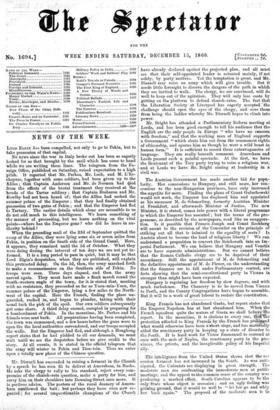Mr. Disraeli has succeeded in raising a ferment in the
Church by a speech he has seen fit to deliver at Amersham, in Bucks. He asks' the clergy to rally to his standard, reject every com- promise of the church-rate question, make a party for him, and carry him on their shoulders into Downing Street once more. It is perilous advice. The pastors of the rural deanery of Amers- ham swallowed the bait ; but perhaps they have even now re- pented; for several unquestionable champions of the Church have alleady declared against the projected plan, and all must see that their self-appointed leader is actuated mainly, if not solely, :by party motives. Yet the temptation is great, and Mr. Disraeli may raise an army which will give trouble. But it needs little foresight to discern the dangers of the path in which they are invited to walk. The clergy, we are convinced, will do well to keep out of the agitation. They will only lose caste by getting on the platform to defend church-rates. The fact that the Liberation Society at Liverpool has eagerly accepted the challenge should open the eyes of the clergy, and save them from being the ladder whereby Mr. Disraeli hopes to climb into power.
Mr. Bright has attended a Parliamentary Reform meeting at Leeds, and has been good enough to tell his audience that the English are the only people in • Europe "who have no concern with freedom," and that the working man of England supports a Government "which shuts him out from the commonest rights of citizenship, and spurns him as though he were a wild. beast in human form." It is sufficient to record these extrivaganoies 'of language. They are really beneath comment. Amersham and Leeds present each a painful spectacle. At the first, we have the lieutenant of the Tory party trying to raise a religions, war; and. at Leeds we have Mr. Bright aiming at leadership in A civil war.


























